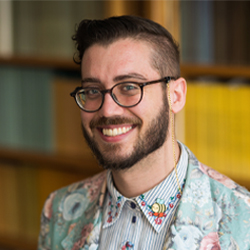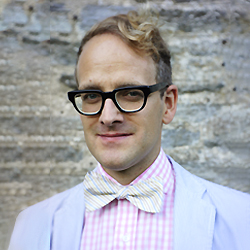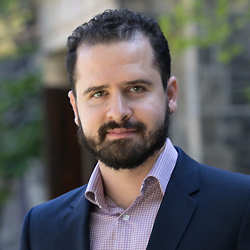The A&S Superior Teaching Awards recognize some of the Faculty of Arts & Science’s most exceptional sessional lecturers and graduate student course instructors for their contributions to undergraduate education.
Congratulations to this year's recipients:
C Dalrymple-Fraser — Graduate Student Course Instructor, Department of Philosophy
 Teaching a course on death and dying during a global pandemic isn’t easy.
Teaching a course on death and dying during a global pandemic isn’t easy.
C Dalrymple-Fraser was recognized by the Department of Philosophy for their excellent work teaching Ethics: Death and Dying — a course focused on contemporary issues of death and dying in healthcare systems.
Dalrymple-Fraser’s teaching stood out for designing a course that targeted the development of advanced philosophical as well as interdisciplinary skills needed for a third-year bioethics course.
At the same time, Dalrymple-Fraser’s approach to the virtual classroom was exemplary for accessibility and creating a safer and supportive environment for students to discuss difficult and sensitive topics such as death and suicide, especially during the pandemic.
In fact, even before the course began, Dalrymple-Fraser received messages from students hoping to enrol who had recently lost family members to COVID-19.
Taking this responsibility of teaching in such a difficult environment very seriously, they completed several training sessions on psychological crisis response and first aid. They also circulated a survey before classes started so that students could identify access needs and offer thoughts about what was working or needing adjustments in their experiences with online learning.
One student states Dalrymple-Fraser’s class was “the best experience I've had since we've transitioned to online learning, and that class still has me considering ideas that I'll be pondering even after graduation.”
Shawn Micallef — Senior Lecturer II, University College
 Shawn Micallef’s mission when teaching his students at University College about Toronto is to “connect people to their city… engaging them with the city and empowering them to feel like they can contribute to it and even improve it.”
Shawn Micallef’s mission when teaching his students at University College about Toronto is to “connect people to their city… engaging them with the city and empowering them to feel like they can contribute to it and even improve it.”
Through his course, Citizenship and the Canadian City, Micallef provided students with the opportunity to think more critically about civic engagement by addressing topics such as public space, political membership, civic responsibility and belonging. Students were also given the chance to reflect on pressing topics such as the COVID pandemic as well as long-simmering issues like housing.
Both in his work and in his teaching, he combines social, political and historical insights into the cityscapes of Toronto with actionable items, for example, regarding the livability of our city or the preservation of its architectural heritage.
The teaching award also recognizes Micallef’s course and teaching approach, combining hands-on and walkthrough experiences with readings and reflections, all of which could serve as a model for other experiential courses in the social sciences and humanities.
One student declares, “Little did I know when I enrolled, that Shawn Micallef's instruction and engagement would change the trajectory of my formal education and renew my passion for Toronto's urbanism, municipal politics and the meaning of the public realm.”
Igor Shoikhedbrod — Sessional Lecturer, Ethics, Society & Law, Trinity College
 Igor Shoikhedbrod’s teaching style could be best described as “old school” and "Socratic.”
Igor Shoikhedbrod’s teaching style could be best described as “old school” and "Socratic.”
Shoikhedbrod’s teaching style is far from flashy — there are few PowerPoint presentations, bright graphics or cutting-edge classroom technologies used. Instead, with simple slides or a blackboard and chalk, Shoikhedbrod’s words bring the content to life.
Over several years, Shoikhedbrod has taught courses in the Trinity One Program and in the Ethics, Society & Law Program at Trinity College. Specifically, he has taught courses such as Public Policy and the Public Good, Political Economy & Social Inequality, Ethics and the Law, and Classical Social and Political Thought from the 18th Century Enlightenment to the 20th Century.
The award recognizes his efforts to deepen students’ understanding of the subject matter by connecting course material to current events and news stories, illustrating complex theories in ways that are tangible and easy to grasp.
Shoikhedbrod also structures his courses to allow students to learn where they need to improve by giving small assignments. One student says this technique “improved my writing immensely, more than any other course. It taught me how to write concisely and kept me engaged with the readings. It also enabled demonstrating one's improvement over time.”
Another student declares, “Even in a first-year course, he offered insights into what we might expect in upper-year seminars or in pursuing graduate school. Shoikhedbrod set a high bar and gave students the opportunity to rise to it.”
Matt Sourisseau — Graduate Student Course Instructor, Department of Mathematics
If you've ever wondered what chicken McNuggets have to do with number theory, Matt Sourisseau can tell you. One of his favourite outreach talks connects these seemingly unrelated things, bringing mathematics to life.
Giving such talks was just one of the many ways Sourisseau was involved in outreach activities for the Department of Mathematics. He was also instrumental in rebooting the Math Academy program, the Department’s high-school outreach program.
Jointly designing and teaching six completely different week-long math camps, Matt enthusiastically exposed high-school students to a wide variety of extra-curricular topics ranging from the Google PageRank algorithm to construction of the regular heptadecagon, as well as the famous three-body problem.
Back in the classroom, one of the courses Sourisseau taught was Applied Linear Programming — a course he redesigned to further integrate it into the current math curriculum. Thanks in large part to his efforts, course enrolment has exploded over the last few years, from about 150 students to over 300 students.
Says one student, “Matt’s ability to explain complex things in an understandable way and his ability to answer any questions I had for him were major factors in helping me understand the course material in what I perceived to be a challenging course, made even more challenging by the fact that the entire delivery was online.”

